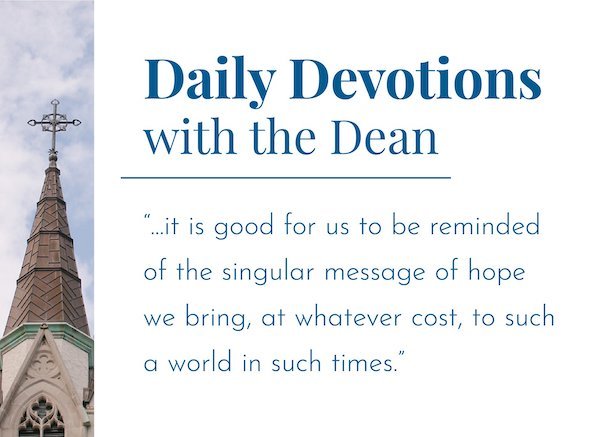Friday • 4/5/2024 •
Friday in Easter Week
This morning’s Canticles are: before the Psalm reading, Pascha Nostrum(“Christ Our Passover,” BCP, p. 83); following the OT reading, Canticle 10 (“The Second Song of Isaiah,” Isaiah 55:6–11; BCP, p. 86); following the Epistle reading, Canticle 18 (“A Song to the Lamb,” Revelation 4:11; 5:9–10, 13, BCP, p. 93)
Friday in Easter Week. I’m thinking mostly, today, about the day’s psalm: Psalm 136.
…for his mercy endures forever… (כִּ֖י לְעוֹלָ֣ם חַסְדּֽוֹ — ki lᵉʿôlām ḥasdo). Psalm 136 sees the whole of cosmic and human history as one occasion after another for the singing of God’s mercy. In creating all things, he shows mercy. … for his mercy endures forever.
In rescuing Israel and giving them an inheritance, he shows mercy. … for his mercy endures forever!
In remembering the lowly and feeding all creatures, he shows mercy. … for his mercy endures forever!
The psalmist can’t even get from one thought to another without interrupting himself to thank the Lord for the unending mercy. Twenty-six verses of remembrance, twenty-six half-verses of grateful self-interruption. It’s wonderful when this psalm is read in corporate worship as call and response, half-verse by half-verse—and even better when the half-verse refrains are in Hebrew! … for his mercy endures forever! … (כִּ֖י לְעוֹלָ֣ם חַסְדּֽוֹ — ki lᵉʿôlām ḥasdo).
The heavens and the earth, in their very existence. Not random. Not from nowhere. Not without design or purpose. Not evil, not neutral, but “good.” Expressions of Yahweh’s, and nobody else’s, … for his mercy endures forever!
Image: Adaptation, Pixabay
And a word from Paul …in a moment, in the twinkling of an eye, at the last trumpet…. (1 Corinthians 15:52). It probably wasn’t the first time I had heard these words, but it was the first time I actually noticed them. It was during a live performance of Handel’s Messiah. The baritone voice, the trumpet accompaniment, the new-old text. The combination was overwhelming, and I’ve never been the same. In the face of death itself we can say: “You don’t win. Christ has beaten you. And I belong to him. No matter when you take me or how you do it, it will only be for a time. I will rise.” “For the trumpet will sound, and the dead will be raised incorruptible and we shall be changed” (1 Corinthians 15:52).
I pray that whatever you face today you face it in the confidence that somewhere in the hardest part of it there is “mercy that endures forever.” I pray that throughout this day, your theme can be: “But thanks be to God, who gives us the victory through our Lord Jesus Christ.” Amen.
Collect for Friday in Easter Week. Almighty Father, who gave your only Son to die for our sins and to rise for our justification: Give us grace so to put away the leaven of malice and wickedness, that we may always serve you in pureness of living and truth; through Jesus Christ your Son our Lord, who lives and reigns with you and the Holy Spirit, one God, now and for ever. Amen.
Be blessed this day.
Reggie Kidd+













